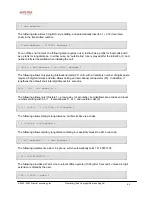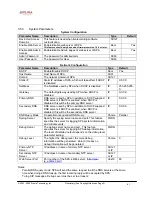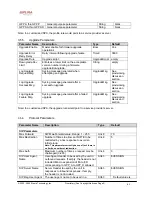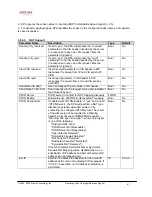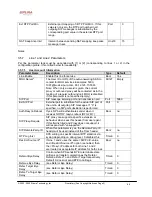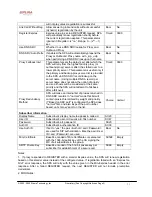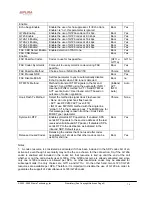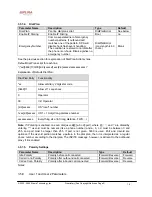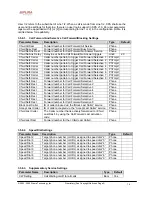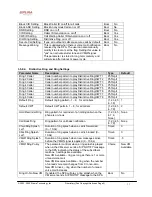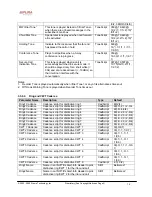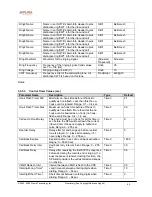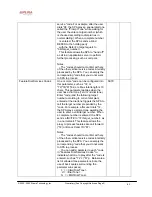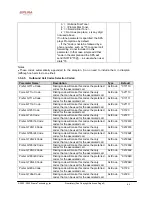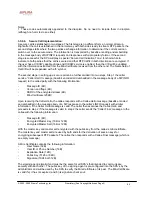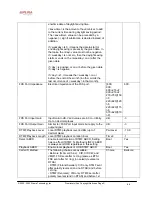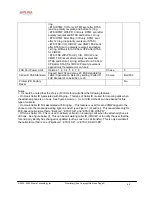
© 2003 - 2005 Sipura Technology, Inc
Proprietary (See Copyright Notice on Page 2)
74
Enable
Echo Supp Enable
Enable the use of echo suppressor. If <Echo Canc
Enable> is “no”, this parameter is ignored
Bool Yes
G729a Enable
1
Enable the use of G729a codec at 8 kbps.
Bool
Yes
G723 Enable
1
Enable the use of G723 codec at 6.3 kbps
Bool
Yes
G726-16 Enable
1
Enable the use of G726 codec at 16 kbps
Bool
Yes
G726-24 Enable
1
Enable the use of G726 codec at 24 kbps
Bool
Yes
G726-32 Enable
1
Enable the use of G726 codec at 32 kbps
Bool
Yes
G726-40 Enable
1
Enable the use of G726 codec at 40 kbps
Bool
Yes
FAX CED Detect Enable Enable detection of FAX tone.
Bool
Yes
FAX CNG Detect
Enable
Bool
Yes
FAX Passthru Codec
Codec to use for fax passthru
{G711u,
G711a}
G711u
FAX Codec Symmetric
Force unit to use symmetric codec during FAX
passthru
Bool Yes
FAX Passthru Method
Choices: None / NSE / ReINVITE
Choice
NSE
FAX Process NSE
Bool
Yes
FAX Disable ECAN
Set this parameter to yes to automatically disable
Echo Canceller when FAX tone is detected
Bool no
DTMF Tx Method
Method to transmit DTMF signals to the far end:
Inband = Send DTMF using the audio path; INFO =
Use the SIP INFO method, AVT = Send DTMF as
AVT events; Auto = Use Inband or AVT based on
outcome of codec negotiation
{InBand,
AVT,
INFO
Auto}
Auto
Hook Flash Tx Method
Select the method to signal Hook Flash events:
• None: do not signal hook flash events
• AVT: use RFC2833 AVT (event=16)
• INFO: use SIP INFO method with the single line
“signal = hf” in the message body. The MIME type for
this message body is taken from the <Hook Flash
MIME Type> parameter
Choice None
Symmetric RTP
Enable symmetric RTP operation. If enabled, SPA
sends RTP packets to the source address of the last
received valid inbound RTP packet. If disabled, SPA
sends RTP to the destination as indicated in the
inbound SDP. Default is yes.
Bool Yes
Release Unused Codec
Releasing the codecs that's not used after codec
negotiation on 1st call so that other codecs can be
used for 2nd line.
Bool Yes
Notes:
1. A codec resource is considered as allocated if it has been included in the SDP codec list of an
active call, even though it eventually may not be the one chosen for the connection. So, if the G.729a
codec is enabled and included in the codec list, that resource is tied up until the end of the call
whether or not the call actually uses G.729a. If the G729a resource is already allocated and since
only one G.729a resource is allowed per SPA, no other low-bit-rate codec may be allocated for
subsequent calls; the only choices are G711a and G711u. On the other hand, two G.723.1/G.726
resources are available per SPA. Therefore it is important to disable the use of G.729a in order to
guarantee the support of 2 simultaneous G.723/G.726 codec.

